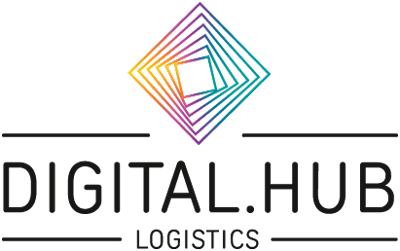An end to Excel lists: Start-up “Logistikbude” makes load carrier management digital
With a new, digital out-of-the-box solution, Dortmund-based Logistikbude is turning load carrier management upside down. In order to establish contacts with companies and exchange experiences with other start-ups, the four founders are now increasingly active in the innovation ecosystem of the Digital Hub Logistics.
Whether euro pallets or window racks, skeleton containers or gas cylinders: In logistics, load carriers are usually only a means to an end. In the company, load carrier management is therefore of secondary importance. When which load carriers are located where is often only recorded manually and irregularly checked or reconciled using Excel lists or PDFs. At the same time, the costs caused by the loss of load carriers are enormous. “When pallets and the like have to be reordered at high cost, everyone in the company complains. But too little happens,” observed Philipp Wrycza, one of the four founders of Logistikbude, based in Dortmund. “But with our platform for digital load carrier management, we want to and can fundamentally change that.”
Companies can log onto Logistikbude’s web platform, generate barcodes for their load carriers, download them and print them out on site. A digital file is created for each individual load carrier when the label is generated, documenting each scan of the barcode and thus the entire history. The unique selling point of the founders is the automatic reconciliation of the accounts of all partners involved, provided they are also represented on the platform. “This is particularly exciting for freight forwarders,” Wrycza points out. “Because it usually takes six to eight weeks from the physical exchange at the ramp to invoicing. With us, it only takes a few days.”
Simple solution, complex technology
The solution appears so impressively simple that outsiders involuntarily ask themselves why someone hadn’t thought of it before? In fact, there is a highly complex technology behind the platform, which was developed by the founders of Logistikbude in more than three years of research work in the Enterprise Lab supported by the Fraunhofer Institute for Material Flow and Logistics IML and the European Pallet Association e.V. (EPAL) in Dortmund, Germany. Most recently, the scientists were able to integrate the documentation of the exchange via app from a development project of the “Silicon Economy”, a Fraunhofer IML project for the realization of a federated platform economy in logistics, into their solution.
Thus, the innovation ecosystem of the Digital Hub Logistics has already proven its worth before the start-up was (out)founded – and as part of the further development of their company, the founders continue to rely on the network, the infrastructure and the community on site. The MotionMiners, another successful spin-off from Fraunhofer IML, are a role model, having initially moved into offices in the hub’s coworking spaces with their company.
Fueling the start-up spirit
In recent months, however, the Corona pandemic has slowed down the founders – like so many other companies – to some extent: “Part of the essence of a start-up is that we as founders and employees regularly get together and brainstorm, but we are also out and about at trade fairs and events, where we get to know fellow campaigners and potential customers in an uncomplicated way,” says Philipp Wrycza. “All that was missing, and it still does. That’s precisely why the Digital Hub Logistics is an important contact point for us to rekindle the start-up spirit. We look forward to being able to take advantage of the hub’s many offerings – especially the exchange of experiences with startups or the start-ins of grown companies.”
In addition, Logistikbude also hopes to make contact with companies that use its solution: “What’s great is that many companies give us the opportunity to meet for online meetings. That’s less complicated than an on-site meeting, and you often get the appointment right away. However, the commitment afterwards is also not as high,” says Philipp Wrycza. “There’s nothing like walking through the company together and becoming aware of sticking points that simply can’t be communicated via the monitor.”
First projects already running
Logistikbude primarily addresses two customer groups: On the one hand, these are companies with closed pools, mostly small or medium-sized businesses, where load carriers are only used in their own company or by a handful of partners. On the other hand, the solution is also suitable for open pools in which millions of load carriers circulate. In Europe alone, for example, there are currently 600 million euro pallets, 135 million automotive small load carriers (KLTs), 600 million crates for fruit and vegetables, and 700 million meat and bread crates in circulation in such open pools. The customers then tend to be large companies or corporations. The first projects are already underway. They not only serve to optimize the solution and gather customer feedback, but should also lead to very specific orders after the test phase.





